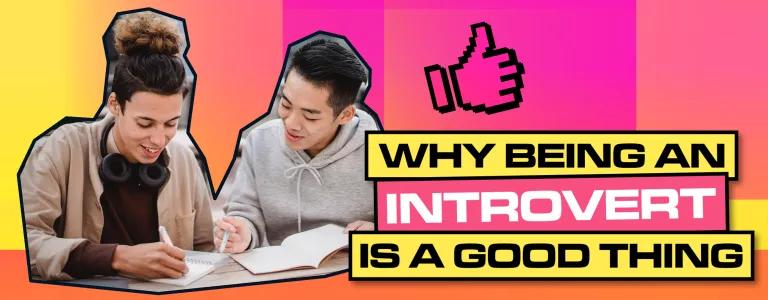
Why Being An Introvert Is A Good Thing
Let’s face it. We live in a world built for extroverts; where having wide social circles, being able to speak up and out, and enjoying attention and recognition is the norm. Especially these days with social media and influencer life being such a big, and easily attainable thing. But what if you’re not naturally extroverted? The introverts of the world are constantly given self help guides on ‘how to be more extroverted’ and why ‘taking tips from these extroverts can help you be more confident’. Why is introversion seen as such a disadvantage? Why aren’t there any guides titled ‘hey extroverts, why don’t you shut up and listen for a bit’!

Because the thing is, being an introvert isn’t this short straw that it’s been made out to be. Introverts often get mislabeled as ‘shy’ or ‘nervous’ or even ‘weak’. When it really has nothing to do with that at all. Introversion and extroversion are both words that describe how people handle different situations in their life. Let’s take recharging your energy as an example. If you’re an extrovert you’ll most likely turn to other people to refill your batteries. You’re comfortable in crowds of people and find that actually it can shift your mood in a more positive way. If you’re an introvert, it doesn’t mean you don’t have a bunch of friends too! But, to recharge, you’re more likely to turn inwards and focus on yourself, by spending time alone to recuperate. You could be the life of the party at a party, but, when it comes to figuring stuff out, you want your own personal space to do that, without external stimulation.
So let’s talk about the benefits of being an introvert, and why everyone should lean into that side of their personality - after all, the ‘vert’ side of us isn’t binary. It’s definitely a sliding scale and people can be both extroverted and introverted at the same time!
Introverts are great observers
Because introverts tend to reflect inwards, it means that in a lot of situations, they might be found watching, rather than participating. They’ll carefully watch how scenarios play out before immersing themselves in them. This means introverts are also pretty good at noticing other people’s body language and facial expressions, and generally reading a room. Which in turn, makes introverts great at communicating!

Introverts choose words wisely
Because of this observant nature, introverts tend to pick when they speak and what they say carefully. While extroverts gain energy from other people and from throwing themselves into situations, even if it’s brand new, introverts will usually take time to themselves and think, before contributing. Which means that a lot of people find introverts to be loyal, dependable, and trustworthy, as it’s unlikely that they’re going to say something they don’t mean, or something just for the sake of it. Processing time (and it might only be a minute or two!) also can mean that introverts have great problem solving skills too, as they’ll put in effort to figure something out before giving a solution.
Introverts keep friends close
Unlike extroverts - who gain their energy from being around other people - introverts are more likely to feel drained when being around lots of people for long periods of time. Again, that doesn’t mean they don’t have friends, some introverts have lots of different friendship circles! However, it’s more likely that an introvert will pick which friends to hang out with at particular times, and are more guarded when it comes to who is in their inner circle. In most cases, once you’re in, you’re in for life, as introverts are extremely loyal, attentive and committed to the people they do hold close. It’s also not uncommon for introverts to appear more extroverted when they’re with these groups of friends, as they feel relaxed and comfortable enough to let themselves move around on the ‘vert’ scale! Introverts will also commonly look for deeper ways to connect with people they are meeting for the first time. Not ones for small talk (like the weather, or what you had for dinner last night), introverts are usually far more interested in what makes you, you. They’ll rather talk to one person at a party for the entire night than have quick conversations with twenty people that they won’t actually get to know. It’s all about quality over quantity!

Introverts are comfortable on their own
Just as much as they like quality time with their close friends, introverts enjoy - and seek out - time alone. It’s essential to recharge and recuperate, but it also means that introverts tend to understand the importance of being able to say yes - and no - to certain things and prioritise time. It’s all about setting boundaries with yourself and other people and taking that seriously. And hey, research shows that saying no to things can help you achieve goals faster and grant yourself the space and recovery time you need. Because of this, introverts tend to be very self-sufficient and independent!
Introverts are compassionate
Because introverts value alone time so much it means that they’re likely to be incredibly self-aware and knowledgeable about their wants and needs. But this isn’t something that just sticks with them. They carry this awareness and knowledge on to the people in their life. Whether that's a friend, a partner, or a family member, introverts are likely to be the person who asks what you need, how you need it, and how they can help. Introverts show compassion and empathy in everything they do, which makes for great leadership, as listening to the wants and needs of your teammates and figuring out how to make everyone happy is always a good thing!

What do you think? Are you naturally introverted or are you someone who needs to lean into that side of your personality more? Let us know why you think being an introvert is a good thing over on Insta at @NCS!




